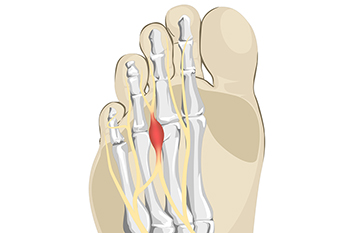
Morton’s neuroma is a painful condition affecting the foot, specifically involving a thickening of the tissue surrounding a nerve, often between the third and fourth toes. This condition can be caused by various factors, including wearing tight shoes, high heels, high foot arches, or engaging in repetitive activities that put pressure on the feet. Symptoms include sharp, burning pain in the ball of the foot, a sensation of having a pebble in the shoe, and tingling or numbness in the toes. These symptoms can worsen with activity and improve with rest. Initial treatment options include wearing wider shoes or using orthotic inserts. However, if symptoms persist or worsen, medical intervention may be necessary. A podiatrist might recommend corticosteroid injections, targeted exercises, or, in severe cases, surgical options to relieve the pressure on the nerve. If you are experiencing symptoms of Morton’s neuroma, it is suggested that you schedule an appointment with a podiatrist for a comprehensive evaluation and effective treatment options.
Morton’s neuroma is a very uncomfortable condition to live with. If you think you have Morton’s neuroma, contact Jeffrey L. Bober, DPM of Maryland. Our doctor will attend to all of your foot care needs and answer any of your related questions.
Morton’s Neuroma
Morton's neuroma is a painful foot condition that commonly affects the areas between the second and third or third and fourth toe, although other areas of the foot are also susceptible. Morton’s neuroma is caused by an inflamed nerve in the foot that is being squeezed and aggravated by surrounding bones.
What Increases the Chances of Having Morton’s Neuroma?
- Ill-fitting high heels or shoes that add pressure to the toe or foot
- Jogging, running or any sport that involves constant impact to the foot
- Flat feet, bunions, and any other foot deformities
Morton’s neuroma is a very treatable condition. Orthotics and shoe inserts can often be used to alleviate the pain on the forefront of the feet. In more severe cases, corticosteroids can also be prescribed. In order to figure out the best treatment for your neuroma, it’s recommended to seek the care of a podiatrist who can diagnose your condition and provide different treatment options.
If you have any questions, please feel free to contact our office located in Glen Burnie, MD . We offer the newest diagnostic and treatment technologies for all your foot care needs.
